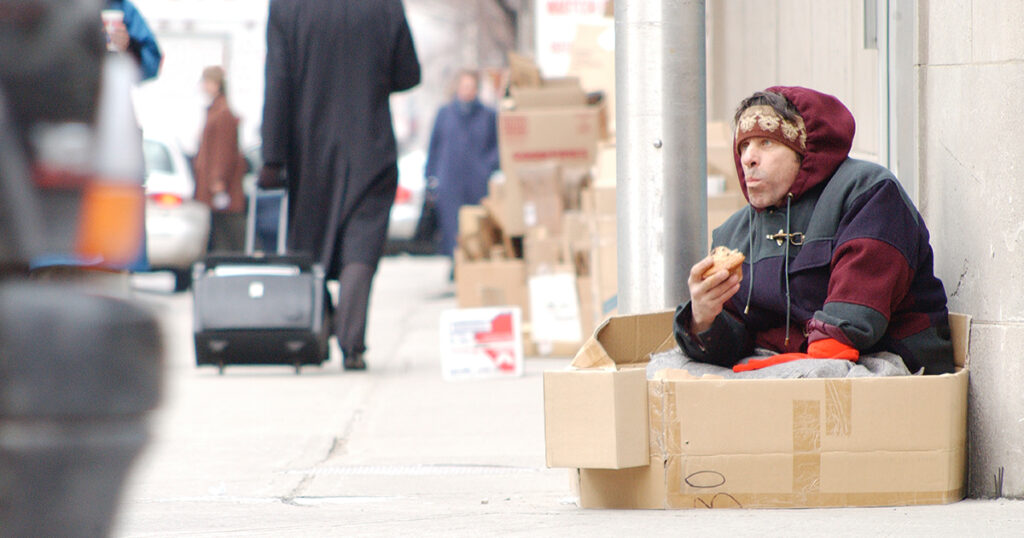
The Biblical Charities Continuing Education, which promotes applied mercy-education in connection with The Lutheran Church—Missouri Synod, sponsored a roundtable discussion on “Caring for the Homeless with the Theology of the Cross.”
The series featured case studies and discussions from church workers with extensive experience in ministry to the homeless. Also included is a “protocol” for homeless ministry developed through roundtable discussions of these essays.
LCMS Urban & Inner-City Mission provides the following resources, which expertly apply Lutheran theology to specific ethical and theological problems related to homeless ministry, for study and application. The documents provide practical solutions for how to undertake this important work.
Summary of goals
What did we want to do?
A.) Provide case studies that describe helping the homeless in a manner consistent with Evangelical Lutheran theology;
B.) Develop a protocol that lists practical steps for helping the homeless (including substance abusers and those suffering from mental illness); and
C.) Initiate a network of communication between congregations involved in caring for the homeless, substance abusers, and those suffering from mental illness.
A brief protocol for dealing with the homeless
The setting: Your congregation.
The situation: A homeless person asks for aid.
Your congregation wants to help those in need. Follow a simple checklist of considerations to get you started.
Case Studies
“Applying Law and Gospel When Housing the Homeless”
Presenter: Rev. Isaac Schuller
Thesis: Housing and caring for the homeless within the confines of the church will include handling situations that arise when homeless individuals do not follow the rules. In addition to law contexts, the caregiver guides the individual to the way of the Gospel through catechesis.
“Repentance and Psychiatric Illness”
Presenter: Rev. Tim Beck, M.Div., M.A., S.T.M.
Thesis: When prescribed anti-depressants create or enhance compulsive desires to engage in actions harmful to self and neighbor, confession/absolution remains vital for spiritual healing in the penitent Christian’s life.
“Restoring Dignity in Homeless People through Teaching Identity in Christ”
Presenter: Deaconess Carole Terkula
Introduction and thesis: The majority of homeless people struggle with a sense of worthlessness, of feeling “less than” due to their circumstances and place in society. While the church reaches out with holistic care, we are best equipped in providing Gospel comfort and reassurance of God’s promises to our homeless neighbors. In the care of souls, the church points to each Christian’s identity in Christ in whom we are rooted. Indeed, the church’s proclamation and affirmation of homeless people’s great worth in the eyes of our Lord Jesus Christ is central to their overall well-being and healing.
“ ‘I Planted; Apollos Watered’: Stewards of the Mysteries of God to the Chronically Homeless”
Presenter: Rev. Mark P. Braden, M.S., M.Div., S.T.M.
Introduction and thesis: The majority of homeless people struggle with a sense of worthlessness, of feeling “less than” due to their circumstances and place in society. While the church reaches out with holistic care, we are best equipped in providing Gospel comfort and reassurance of God’s promises to our homeless neighbors. In the care of souls, the church points to each Christian’s identity in Christ in whom we are rooted. Indeed, the church’s proclamation and affirmation of homeless people’s great worth in the eyes of our Lord Jesus Christ is central to their overall well-being and healing.
“No Home and No Hope: The Connection Between Abuse and Homelessness”
Presenter: Deaconess Kim Schave, Ph.D., C.P.A.
Thesis: Homelessness can be caused by a number of issues, but abuse and Intimate Partner Violence are frequently the culprits.
“The Role of Hope and Love on the Road to Recovery from Addiction and Homelessness”
Presenter: Rev. Dr. Steven D. Schave, director of LCMS Church Planting and director of LCMS Urban & Inner-City Mission
Thesis: Without purpose, strong relational ties, and hope for the future, those suffering from addiction are more likely to remain addicted and living on the streets.
Bibliography
The bibliography for this series is anything but exhaustive. However, it provides a broad list of resources that proved helpful to some in providing mercy care to the homeless. Topics include caregiving rooted in the theology of the cross, sociological phenomena, the ability to evaluate economic disparities, and counseling techniques.
About our sponsor
Biblical Charities Continuing Education
Biblical Charities Continuing Education (BCCE) exists to promote applied mercy-education in connection with The Lutheran Church—Missouri Synod. For more than 25 years, BCCE has funded a wide variety of mercy-education projects for congregations, consortiums, Recognized Service Organizations, parochial schools, and institutions of higher education.